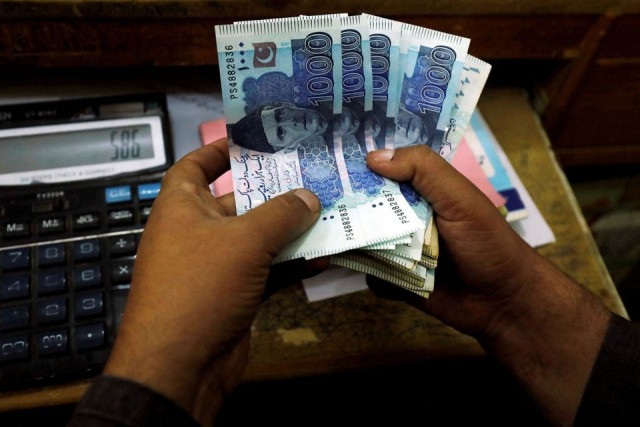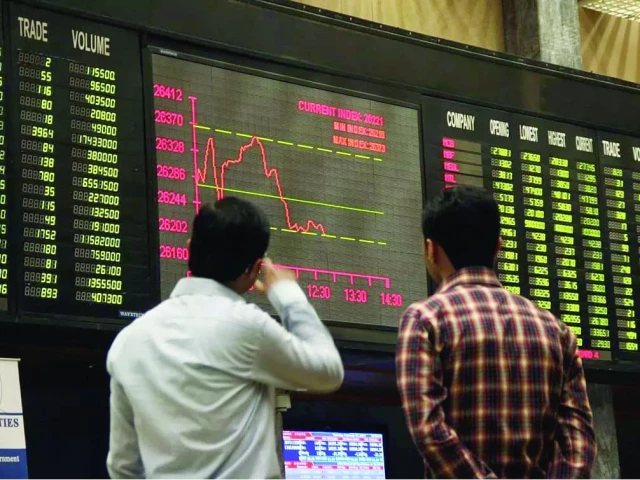Business
Gaps in anti-laundering efforts: IMF | The Express Tribune

ISLAMABAD:
The International Monetary Fund (IMF) has observed that Pakistan is not effectively using data on the ultimate real owners of companies, creating hurdles in disrupting corruption-related laundering schemes and checking front companies from securing government contracts.
The global lender’s draft report on the Governance and Corruption Diagnostic Assessment revealed major flaws in the effective implementation of the country’s beneficial ownership regime.
The IMF found “little evidence of routine coordination” between the Securities and Exchange Commission of Pakistan (SECP) and investigation agencies for exchanging and using beneficial ownership data in financial investigations.
However, Pakistani authorities disagreed with the IMF’s findings, stating that agencies were using beneficial ownership data, except in the case of Designated Non-Financial Businesses and Persons (DNFBPs).
Pakistan tightened its beneficial ownership rules about eight years ago as part of Financial Action Task Force (FATF) conditions. However, as in many other cases, implementation remains far below the desired goals.
The IMF stated that effective use of beneficial ownership information in financial investigations requires regular exchanges between the SECP, the State Bank of Pakistan (SBP), the Federal Board of Revenue (FBR), commercial banks, money service providers, and investigation agencies.
The IMF’s diagnostic mission recommended that Pakistan institutionalise a multi-agency working group to review beneficial ownership data in support of corruption investigations.
The IMF noted that Pakistan’s beneficial ownership framework is an important foundational tool, but weaknesses in registry implementation, verification, enforcement, and inter-agency access reduce its impact.
“Addressing these challenges will be essential to ensuring that beneficial ownership transparency plays a meaningful role in the identification and disruption of corruption-related laundering schemes,” the global lender observed.
It added that access to accurate and timely beneficial ownership data is essential not only for detecting illicit financial flows but also for uncovering conflicts of interest in public procurement, particularly when public officials or their close associates have undisclosed stakes in bidding firms.
Pakistani authorities said that, as part of effective inter-agency coordination, the SECP has provided direct access to its beneficial ownership database to investigation agencies. They said the Financial Monitoring Unit (FMU) was regularly using the data to analyse suspicious transactions.
In 2018, the SECP directed companies to collect information about their real owners to address FATF concerns about transparency in company ownership structures. The directions had been given to uncover layers of secrecy hiding ultimate beneficial owners.
All companies with legal persons as members or shareholders are required to obtain and maintain information from their members and shareholders about the ultimate beneficial owners.
The minimum information required includes the owner’s full name, father’s or husband’s name, NIC/NICOP/passport number, nationality, country of origin, email address, usual residential address, the date on which the name was entered into the register, and the date and reason the person ceased to be the beneficial owner.
Section 453 of the Companies Act 2017 also requires every company officer to endeavour to prevent fraud and offences of money laundering, including predicated offences under the Anti-Money Laundering Act 2010, in relation to the company’s affairs.
However, the IMF found serious gaps in the implementation of these laws and rules, hindering the disruption of illicit money flows.
Global bodies agree that collusive practices can only be mitigated by exposing front companies used to siphon public funds and by supporting fair competition in government contracting.
The IMF said that ensuring contracting authorities, integrity bodies, and investigative agencies can effectively access and cross-reference beneficial ownership data with procurement records is critical to advancing governance reform and restoring public trust.
The effectiveness of financial institutions and Designated Non-Financial Businesses and Professions (DNFBPs) in detecting and reporting corruption-linked transactions remains limited, the IMF stated.
Pakistan’s legal and regulatory framework requires reporting entities — including banks, money service businesses, and DNFBPs — to implement risk-based customer due diligence, conduct enhanced due diligence on politically exposed persons (PEPs), and file suspicious transaction reports (STRs). However, implementation is uneven and often inadequate in addressing high-risk areas associated with corruption.
Pakistani authorities said some state agencies were actively using the SECP’s online beneficial ownership database to enrich financial intelligence. The FMU continues to advocate improved access to beneficial ownership data for key stakeholders and stronger implementation of anti-money laundering obligations by reporting entities through targeted guidance, training, and inter-agency collaboration.
Financial institutions have made notable progress in applying risk-based customer due diligence and conducting enhanced due diligence on politically exposed persons (PEPs).
However, challenges remain, particularly in the DNFBP sector, where the level of technical capacity, compliance culture, and supervisory coverage vary, according to Pakistani authorities.
Business
Serial rail fare evader faces jail over 112 unpaid tickets

One of Britain’s most prolific rail fare dodgers could face jail after admitting dozens of travel offences.
Charles Brohiri, 29, pleaded guilty to travelling without buying a ticket a total of 112 times over a two-year period, Westminster Magistrates’ Court heard.
He could be ordered to pay more than £18,000 in unpaid fares and legal costs, the court was told.
He will be sentenced next month.
District Judge Nina Tempia warned Brohiri “could face a custodial sentence because of the number of offences he has committed”.
He pleaded guilty to 76 offences on Thursday.
It came after he was convicted in his absence of 36 charges at a previous hearing.
During Thursday’s hearing, Judge Tempia dismissed a bid by Brohiri’s lawyers to have the 36 convictions overturned.
They had argued the prosecutions were unlawful because they had not been brought by a qualified legal professional.
But Judge Tempia rejected the argument, saying there had been “no abuse of this court’s process”.
Business
JSW Likely To Launch Jetour T2 SUV In India This Year: Reports

JSW Jetour T2 Launch: JSW Motors Limited, the passenger vehicle arm of the JSW Group, is reportedly preparing to enter the Indian car market this year. It has partnered with Jetour, a China-based automotive brand owned by Chery Automobile, and the Jetour T2 SUV could be the company’s first product, according to the reports.
Media reports suggest that the launch will happen independently and not under the JSW MG Motor India joint venture. The SUV will wear a JSW badge and name, instead of the Jetour branding. The upcoming SUV will be assembled at JSW’s upcoming greenfield manufacturing facility in Chhatrapati Sambhaji Nagar, Maharashtra.
According to the reports, the company plans to have the vehicle on sale by the third quarter of this year. With this move, JSW aims to establish itself as a standalone carmaker in India.
Expected Powertrain
The SUV is likely to arrive with a 1.5-litre plug-in hybrid setup. Internationally, this hybrid powertrain is offered with both front-wheel drive and all-wheel drive options. It is still unclear which version will be introduced in India.
Design
In terms of design, the T2 is a large and rugged-looking SUV. It has a boxy and upright stance, similar to vehicles like the Land Rover Defender. Despite its tough appearance, it uses a monocoque chassis instead of a ladder-frame construction.
Size
The SUV measures around 4.7 metres in length and nearly 2 metres in width. This makes it larger than the Tata Safari, even though it is a five-seater. A longer 7-seat version is also sold in some markets.
Price
Pricing details for India are yet to be announced. For reference, the front-wheel-drive five-seat T2 i-DM is priced at AED 1,44,000 (around Rs 35 lakh) in the UAE.
Jetour
Jetour is a brand owned by Chinese automaker Chery. Launched in 2018, it focuses mainly on SUVs and is present in markets across China, the Middle East, Africa, Southeast Asia and Latin America.
Business
John Swinney under fire over ‘smallest tax cut in history’ after Scottish Budget

John Swinney has been pressed over whether this week’s Scottish Budget gives some workers the “smallest tax cut in history” – with Tory leader Russell Findlay branding the reduction “miserly” and “insulting”.
The Scottish Conservative leader challenged the First Minister after Tuesday’s Holyrood Budget effectively cut taxes for lower earners, by increasing the threshold for the basic and intermediate bands of income tax.
But Mr Findlay said that would leave workers at most £31.75 a year better off – saying this amounts to a saving of just £61p a week
“That wouldn’t even buy you a bag of peanuts,” the Scottish Tory leader said.
“John Swinney’s Budget might even have broken a world record, because a Scottish Government tax adviser says it ‘maybe the smallest tax cut in history’.”
Raising the “miserly cut” at First Minister’s Questions in the Scottish Parliament, Mr Findlay demanded to know if the SNP leader believed his “insulting tax cut will actually help Scotland’s struggling households”.
The attack came as the Tory accused the SNP government of increasing taxes on higher earners, with its freeze on higher income tax thresholds, which will pull more Scots into these brackets.
This is needed to pay for the “SNP’s out of control, unaffordable benefits bill”, the Conservative added.
Mr Findlay said: “The Scottish Conservatives will not back and cannot back a Budget that does nothing to help Scotland’s workers and businesses.
“It hammers people with higher taxes to fund a bloated benefits system.”
Hitting out at Labour – whose leader Anas Sarwar has already declared they will not block the government’s Budget – Mr Findlay said: “It is absolutely mind-blowing that Labour and other so-called opposition parties will let this SNP boorach of a budget pass.
“Don’t the people of Scotland deserve lower taxes, fairer benefits and a government focused on economic growth?”
Mr Swinney said the Budget “delivers on the priorities of the people of Scotland” by “strengthening our National Health Service and supporting people and businesses with the challenges of the cost of living”.
He insisted income tax decisions in the Budget would mean that in 2026-27 “55% of Scottish taxpayers are now expected to pay less income tax than if they lived in England”.
The First Minister went on to say that showed “the people of Scotland have a Government that is on their side”.
Referring to polls putting his party on course to win the Holyrood elections in May, the SNP leader added that “all the current indications show the people of Scotland want to have this Government here for the long term”.
Benefits funding is “keeping children out of poverty”, he told MSPs, adding the Budget contained a “range of measures” that would build on existing support.
The First Minister said: “What that is a demonstration of is a Government that is on the side of the people of Scotland and I am proud of the measures we set out in the Budget on Tuesday.”
Meanwhile he said the Tories wanted to make tax cuts that would cost £1 billion, with “not a scrap of detail about how that would be delivered”.
With the weekly leaders’ question time clash coming less than 48 hours after the draft 2026-27 Budget was unveiled, the First Minister also faced questions from Scottish Labour’s Anas Sarwar, who insisted that the proposals “lacks ambition for Scotland”.
Pressing his SNP rival, the Scottish Labour leader said: “While he brags about his £6 a year tax cut for the lowest paid, one million Scots including nurses, teachers and police officers face being forced to pay more.
“Even his own tax adviser says this is a political stunt. So why does John Swinney believe that someone earning £33,500 has the broadest shoulders and therefore should pay more tax in Scotland?”
Mr Swinney, however, said that many public sector workers would be better off in Scotland.
He told the Scottish Labour leader: “A band six nurse at the bottom of the scale will take home an additional £1,994 after tax compared to the same band in England.
“A qualified teacher at the bottom of the band will take home £6,365 more after tax in Scotland than the equivalent in England. There are the facts for Mr Sarwar.”
-

 Politics1 week ago
Politics1 week agoUK says provided assistance in US-led tanker seizure
-

 Entertainment1 week ago
Entertainment1 week agoDoes new US food pyramid put too much steak on your plate?
-

 Entertainment1 week ago
Entertainment1 week agoWhy did Nick Reiner’s lawyer Alan Jackson withdraw from case?
-

 Business1 week ago
Business1 week agoTrump moves to ban home purchases by institutional investors
-

 Sports5 days ago
Sports5 days agoClock is ticking for Frank at Spurs, with dwindling evidence he deserves extra time
-

 Sports1 week ago
Sports1 week agoPGA of America CEO steps down after one year to take care of mother and mother-in-law
-
Sports6 days ago
Commanders go young, promote David Blough to be offensive coordinator
-

 Business1 week ago
Business1 week agoBulls dominate as KSE-100 breaks past 186,000 mark – SUCH TV













